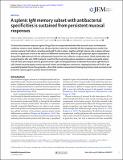Files in this item
A splenic IgM memory subset with antibacterial specificities is sustained from persistent mucosal responses
Item metadata
| dc.contributor.author | Le Gallou, Simon | |
| dc.contributor.author | Zhou, Zhicheng | |
| dc.contributor.author | Thai, Lan-Huong | |
| dc.contributor.author | Fritzen, Remi | |
| dc.contributor.author | de Los Aires, Alba Verge | |
| dc.contributor.author | Mégret, Jérôme | |
| dc.contributor.author | Yu, Philipp | |
| dc.contributor.author | Kitamura, Daisuke | |
| dc.contributor.author | Bille, Emmanuelle | |
| dc.contributor.author | Tros, Fabiola | |
| dc.contributor.author | Nassif, Xavier | |
| dc.contributor.author | Charbit, Alain | |
| dc.contributor.author | Weller, Sandra | |
| dc.contributor.author | Weill, Jean-Claude | |
| dc.contributor.author | Reynaud, Claude-Agnès | |
| dc.date.accessioned | 2018-07-10T10:30:05Z | |
| dc.date.available | 2018-07-10T10:30:05Z | |
| dc.date.issued | 2018-08 | |
| dc.identifier | 254446180 | |
| dc.identifier | 842f1d66-d189-4c4c-ba39-a8cf81475d1a | |
| dc.identifier | 29959173 | |
| dc.identifier | 85054765546 | |
| dc.identifier | 000440828500008 | |
| dc.identifier.citation | Le Gallou , S , Zhou , Z , Thai , L-H , Fritzen , R , de Los Aires , A V , Mégret , J , Yu , P , Kitamura , D , Bille , E , Tros , F , Nassif , X , Charbit , A , Weller , S , Weill , J-C & Reynaud , C-A 2018 , ' A splenic IgM memory subset with antibacterial specificities is sustained from persistent mucosal responses ' , Journal of Experimental Medicine , vol. 215 , no. 8 , pp. 2035-2053 . https://doi.org/10.1084/jem.20180977 | en |
| dc.identifier.issn | 0022-1007 | |
| dc.identifier.other | ORCID: /0000-0003-3457-8364/work/46569365 | |
| dc.identifier.uri | https://hdl.handle.net/10023/15169 | |
| dc.description | This work was supported by the Ligue contre le Cancer (“Equipe labellisée”), the Fondation Princesse Grace de Monaco, and the European Research Council Advanced grants “Memo-B” (to J.-C. Weill) and “B-response” (to C.-A. Reynaud). L.-H. Thai was supported by a Poste d'Accueil INS ERM. | en |
| dc.description.abstract | To what extent immune responses against the gut flora are compartmentalized within mucosal tissues in homeostatic conditions remains a much-debated issue. We describe here, based on an inducible AID fate-mapping mouse model, that systemic memory B cell subsets, including mainly IgM+ B cells in spleen, together with IgA+ plasma cells in spleen and bone marrow, are generated in mice in the absence of deliberate immunization. While the IgA component appears dependent on the gut flora, IgM memory B cells are still generated in germ-free mice, albeit to a reduced extent. Clonal relationships and renewal kinetics after anti-CD20 treatment reveal that this long-lasting splenic population is mainly sustained by output of B cell clones persisting in mucosal germinal centers. IgM-secreting hybridomas established from splenic IgM memory B cells showed reactivity against various bacterial isolates and endogenous retroviruses. Ongoing activation of B cells in gut-associated lymphoid tissues thus generates a diversified systemic compartment showing long-lasting clonal persistence and protective capacity against systemic bacterial infections. | |
| dc.format.extent | 19 | |
| dc.format.extent | 3329686 | |
| dc.language.iso | eng | |
| dc.relation.ispartof | Journal of Experimental Medicine | en |
| dc.subject | QR180 Immunology | en |
| dc.subject | NDAS | en |
| dc.subject.lcc | QR180 | en |
| dc.title | A splenic IgM memory subset with antibacterial specificities is sustained from persistent mucosal responses | en |
| dc.type | Journal article | en |
| dc.contributor.institution | University of St Andrews. School of Physics and Astronomy | en |
| dc.identifier.doi | https://doi.org/10.1084/jem.20180977 | |
| dc.description.status | Peer reviewed | en |
This item appears in the following Collection(s)
Items in the St Andrews Research Repository are protected by copyright, with all rights reserved, unless otherwise indicated.

